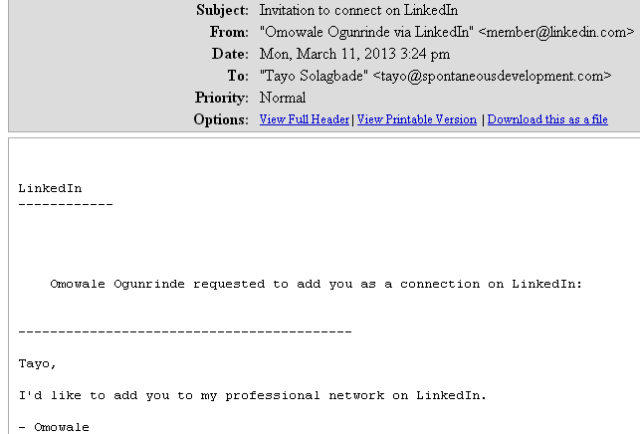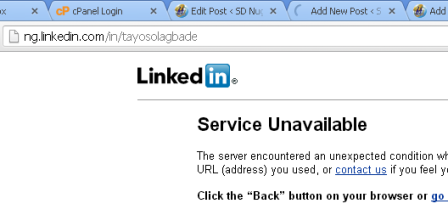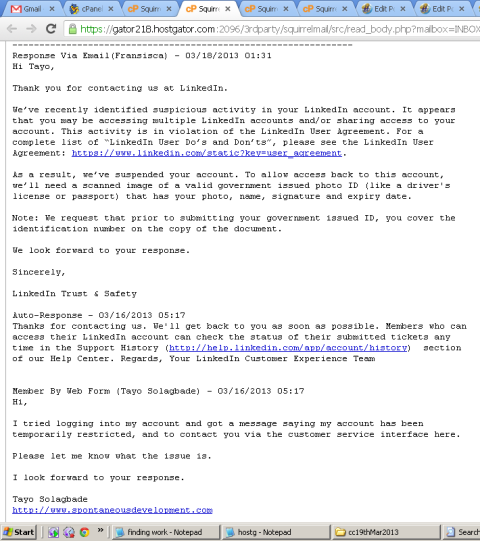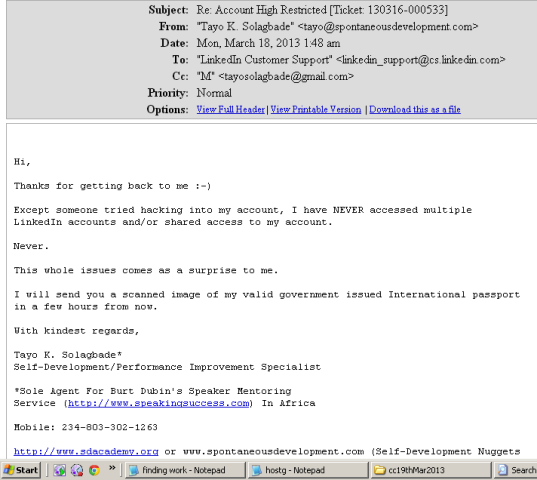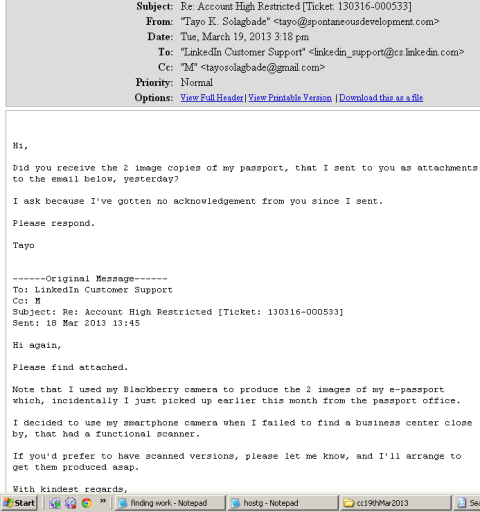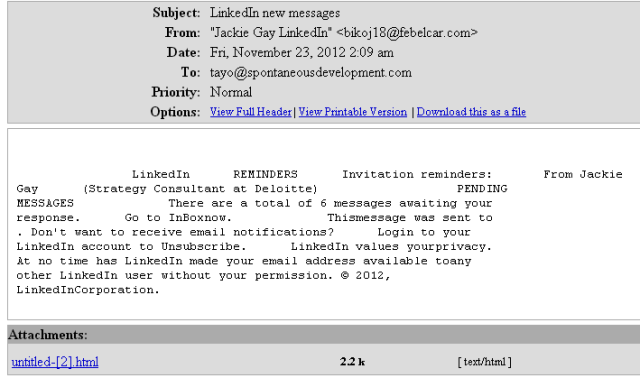





Publication: Tayo Solagbade’s Weekly Public Speaking IDEAS Page (PSIP) Newsletter
Date: Monday 18th February 2013
No: 77
Title: The World Needs You To Manifest Your Genius!
Author & Publisher: Tayo K. Solagbade [234-803-302-1263]
Blog URL: http://www.spontaneousdevelopment.com/blog
Archive (For E-mail only version started 14th May 2012): Click here to view
Archive (For Blog version started 24th September 2011): Click here
Hi,
Please find below the latest issue of my weekly Public Speaking Ideas page for 2013.
|
SD Nuggets Blog™
|
New posts from last week that may interest you! |
| Public Speaking[Monday]: |
|
|
Entrepreneurship [Tuesday]:
|
|
|
Self Development [Wednesday]:
|
|
|
Career Development [Thursday]:
|
|
|
Parenting [Friday]:
|
|
| Writing/Blogging [Saturday]: |
|
| Writing/Blogging [Sunday]: |
|
|
|
|
|
(In Video, Audio, And Also As A PowerPoint Slide show Presentation!)

I’ll be sending out links to the video narrated version of the above presentation in a few weeks. It’s an Educational Commercial designed to help experts (sales/marketing experts, business executives, entrepreneurs etc) understand the tremendous promotional benefits of public speaking.
It features a special message from Burt Dubin, a renowned mentor of some of the world’s highest paid speakers. There’ll also be a video message from Claude Moller, a highly sought after conference speaker and coach, based in South Africa, who enjoys national and international level success that proves the ideas advocated in this presentation work.
Get Notified When It Goes Live – Click HERE!
|
No. 77: The World Needs You To Manifest Your Genius!
**** **********
NB: If you ever find yourself wondering what else I’ve written, some days after you’ve read THIS Speaking Ideas newsletter I send out on a Monday, here’s what you can do to find out: Point your browser to www.sdacademy.org to read at least ONE new post added to my SD Nuggets blog on a different category from Tuesday till Saturday (sometimes even Sundays) in line with this publishing schedule 
**********
If you’re often afraid of socializing with new people, you’re not alone. It’s a fear many people have. But the world needs you to manifest your genius: so you MUST overcome this fear! In this issue of my speaking IDEAS newsletter, I use personal anecdotes to explain how engaging in extracurricular activities (like sports and public speaking) can eliminate fear of socializing in anyone – like it did for me.
Fear Has a Way of Holding A Person Back
When I was much younger, I used to be shy – and afraid of socializing. Once there were strangers or visitors around, I would go strangely quiet. Or even into hiding. And even when I knew stuff that could help others, I was often too terrified to say so!
Looking back, I realize my shyness was even more serious where it concerned members of the opposite sex.
Part of the problem had to do with a bad experience I had with a primary school classmate who falsely accused me of peeping at her in the convenience room (Read the story here). Although the matter was resolved, that experience made me develop a deep aversion for females in general.
But as I grew up, I began feeling what a normal male would feel for females. And that made me uncomfortable being around them. If I found myself too close to one that I fancied just a bit, my mouth would go dry while my heart thumped wildly. Most times I quickly walked away for fear of embarrassing myself. I’m sure you know the feeling 
Extracurricular Activities Can Help You Overcome Fear!
But if there was one place I was never really shy (or afraid of socializing), it was on the handball court. Once the whistle went, I would forget everything else, and immerse myself fully in the game.
When I took part in the open camp trials for the under 12 state team in 1982, I did not know playing handball would help me in that manner. Indeed, all through secondary school, after I got selected, I was not really conscious of its influence on my development of interpersonal competence.
I simply acted on it. But looking back, I know the changes began taking place back then.
Getting to university, my handball proficiency helped me quickly settle in. The first day I trained with the university team, the coach immediately drafted me into the team. In no time I’d made new friends with others in the team and other sports.
The university was a bigger social environment. And the level of serious attention paid to sports persons made it even more prestigious to be one. We got preferential room allocations that was paid for – unlike other students. And we got allowances, training kits issued to us. All we had to do was play to the best of our ability whenever the need arose. It’s the same thing across the world really.
Back in secondary school, I’d gotten a fore taste when, at 15, I earned a call up to the Kwara state camp for the National Sports Festival. While my classmates remained in school, those of us who were selected, were picked up by a bus from the sports council and taken to purpose built accommodation blocks in the state’s new sports complex.
I was later dropped from the final team. But those who went on to play in the competition had their exams conducted for them separately, after they returned.
What I’m trying to say here is that experiences like this have a way of boosting your self-esteem. You get to have the best of both worlds (school and sports), picking up additional know-how within the same period that others may not get.
You Are Forced To “Practice” Socializing
What’s more, you get to do the above by necessarily relating with others.
The following true story should make you laugh…even as it offers useful insight:
During camp for the 1985 sports festival, Aroc – a top member of the state’s female handball team (who also happened to be quite pretty/naughty) – went out of her way to openly flirt with me, at training sessions and elsewhere. Since arriving, I’d been my shy self – retiring to my room after training, to read novels etc, until the next training session.
One day during training, an exercise routine required players of the same gender to pair up. This was because it was a defensive sequence in which players had to alternately push each other in the chest area.
Aroc chose that moment to leave her female colleagues, and plant herself in front of me. Before I could protest, the coach’s whistle blew for us to begin. Knowing how strict he was I decided to do what I could.
Each time she came forward I made sure my palms landed well below her breasts (in the area of her lower ribs). She on her part boldly pushed me – repeatedly – in the chest/breast area smiling innocently all the while.
Our team mates giggled so badly all through that routine, that it was a miracle the coach did not catch on. And afterwards, they teased me about it weeks!
That experience “broke me in” socially, into that group. And although I resisted Aroc’s advances till I was de-camped, my socializing improved considerably after that day 
Your Innate Leadership Skills Could Be Developed
But more seriously, my shyness/fear evaporated over time mainly due to my active involvement in sports. Travelling for hours together in a bus with others, on a regular basis, will eventually make you loosen up.
You’ll meet people who will show excitement when they learn you’re a “member of the state team preparing for the forthcoming XYZ competition”. Many are keen to make friends with someone who shares a similar interest or passion.
By the time I began to gain recognition on the university campus as a starter on the university team (and captain of my hall team), the last thing I felt was shyness.
In that environment, I felt at ease with myself, knowing that I had the competence to relate with anyone on my areas of interest or focus.
But the transformation did not happen overnight. It was a progressive improvement – a key part played by the self-talk I also actively engaged in to keep from withdrawing into my shell.
Basically, I told myself people would want to have me around if they knew I could add value to them. So all I had to do was to be myself, put in my best efforts at all times, and everything would be okay.
And Good Things Will Happen To You MORE Frequently
That’s what eventually happened to me. For instance, below are examples of leadership positions I was nominated/elected into (even though I never indicated interest) by different groups in the last 2 years of my stay in the university:
1. Members of Student’s Farm Research Foundation (SFRF) voted me as Supplies Coordinator on the team of club executives (1991/92).
2. Members of Agricultural Extension department’s Readers’ Club voted me the maiden chairman (1991/92)
3. Members of the Independence Hall handball team nominated me as Captain (1991/92) – In my final year, we won the Inter halls handball competition for the first time since I joined the university(having been runners up 2 years in a row before then).
What made the above achievements even more significant was that I also won an award from the sports council, in addition to emerging best graduating student from my department with the highest ever Cumulative G.P.A of 5.9 (First class was 6.0).
In other words, my academic performance did not suffer due to my active involvement in social activities. It goes without saying that striking a healthy balance of that kind in school, and life in general, is very important.
Final Words: The World Needs You!
At the risk of stating the obvious, I have offered personal examples in this write up, not to brag, but to illustrate the positive outcome I achieved by engaging in extracurricular activities. Without that, I honestly believe I would have struggled greatly.
It’s an excellent way to develop self-esteem and confidence in one’s abilities.
As adults, we can build further on that foundation, no matter the vocations we’re professionally engaged in, to become even more interpersonally effective.
Which brings me to this important point: If you think about it, one thing common to all forms of extracurricular activities is the need to speak or communicate in public. Even when you’re playing sports. Yes, sports involves physical movement mostly, but where team sports in particular are concerned, your ability to speak effectively comes into play.
Competent public speakers are sensitive to both verbal and non-verbal communication. This helps them gauge what to say and how to say it by studying the reactions (body language) of others.
Public Speaking is so central to the existence of human beings in society. That’s why it’s regarded as a crucial skill for achieving high levels of success. If you cannot “win friends and influence people” by speaking, you’ll be very ineffective in your interpersonal relationships.
It therefore follows that learning public speaking can improve your ability to socialize successfully.
That’s why organizations like Toastmasters exist.
But if you prefer private sessions, there are seasoned personal coaches/mentors in public speaking you can approach.
So, what are you waiting for?
Don’t let shyness deny you excellent opportunities to make the most of yourself. People out there need what you have to offer. But if you keep it locked up inside of you, they’ll never get it. And you won’t be fulfilled.
You deserve better than that!
Need Help Deciding How To Cure Your Fear of Socializing?
If you need more specific details of how to make use of the ideas I’ve shared in this newsletter, call me on 234-803-302-1263 or email tayo at tksola dot com.
Alternatively, send me a message using this request form (with “Re: Socializing With New People” in the subject line).

Have a lovely week!

Tayo K. Solagbade*
Self-Development/Performance Improvement Specialist
*Sole Agent For Burt Dubin’s Speaker Mentoring Service In Africa
Mobile: 234-803-302-1263
http://www.spontaneousdevelopment.com
Tayo Solagbade is a Performance Improvement Specialist & multipreneur. He works with individuals/businesses who want to achieve highly profitable outcomes, and also with parents who want to raise real-world competent children.
Tayo earns multiple streams of income providing clients with performance improvement training/coaching, custom MS Excel-VB solutions, web marketing systems, freelance writing services, and best practice extension support services (for farm business owners).
When he’s not amazing clients with his superhuman skills (wink), Tayo works as the creative force behind his Self-Development Nuggets™ blog, and Public Speaking IDEAS newsletter (which he publishes to promote Burt Dubin’s Public Speaking Mentoring service to experts working across the African continent).
==================
Have you been undecided about whether or not to become a paid speaker? Or have you been trying to get your speaking career off the ground with little success?
Here’s a tip: Burt Dubin works with people who want to be speakers, and with speakers who want to be masters. Click here to visit his website NOW and submit a contact form message telling him what challenges you’re facing, and how you’d like him to help you. Tell him I sent you, and you’ll get a pleasant surprise offer from him.
Comments?
What do you think of the above message? Do you have any personal experience to share on this subject? Are there some other points you feel can be added, to help persons looking for answers? Please share your thoughts!
Share this issue!
Do you know anyone who might benefit from reading this newsletter issue? Why not hit the forward button now, and send it to him/her with a short recommendation. You can also use share it via your social media channels. Thanks in advance.





What fears or doubts are keeping you from (a) taking up Burt Dubin’s monthly speaker mentoring, or (b) buying his products?
You can choose to purchase Burt’s mentoring at any of the three (3) levels listed below:
Burt’s three mentoring packages can be likened to the seating options offered by airlines: Budget Delight (Economy); Mid Range (Business); and Top Shelf (First Class).
At least that’s how I like to think of them!
All three will get you to your desired destination of “speaking success-ville” – so long as you meet the requirements/play your part well (your fare, abide by the set guidelines etc). During the “flight”, the seat you have will determine how much personal service attention and preference the provider will accord you. It’s that simple 
So, make your choice:1. Top Shelf [Click here] | 2. Mid Range [Click here] | 3. Budget Delight [Click here]
Send me an e-mail with your questions via tayo at tksola dot com. In the meantime, why not get started by subscribing here to get his 7-Part Course (How To Succeed And Get Paid As A Professional Speaker) . . . and receive his monthly newsletter (Speaking Biz Strategies Letter) at no cost.




